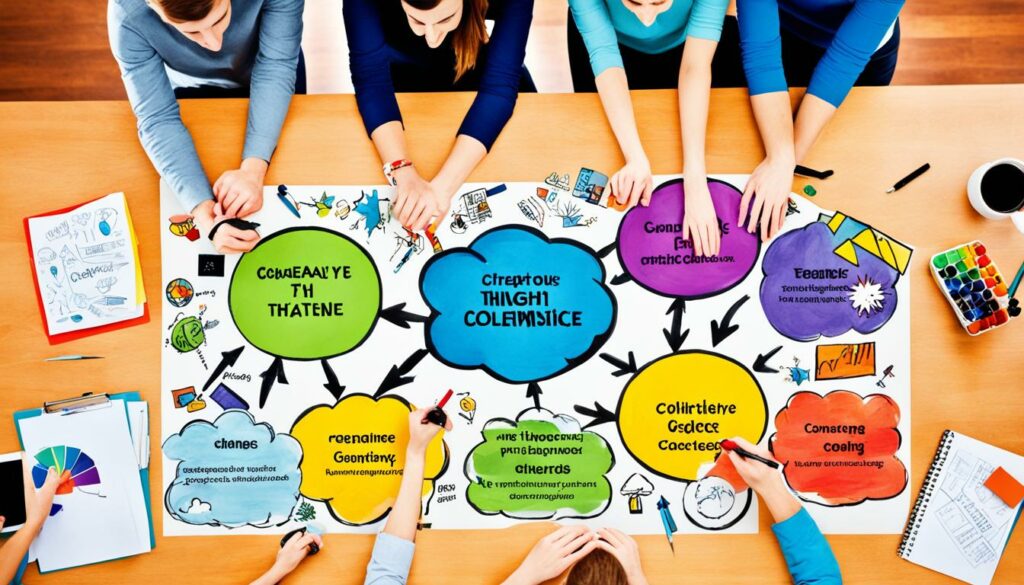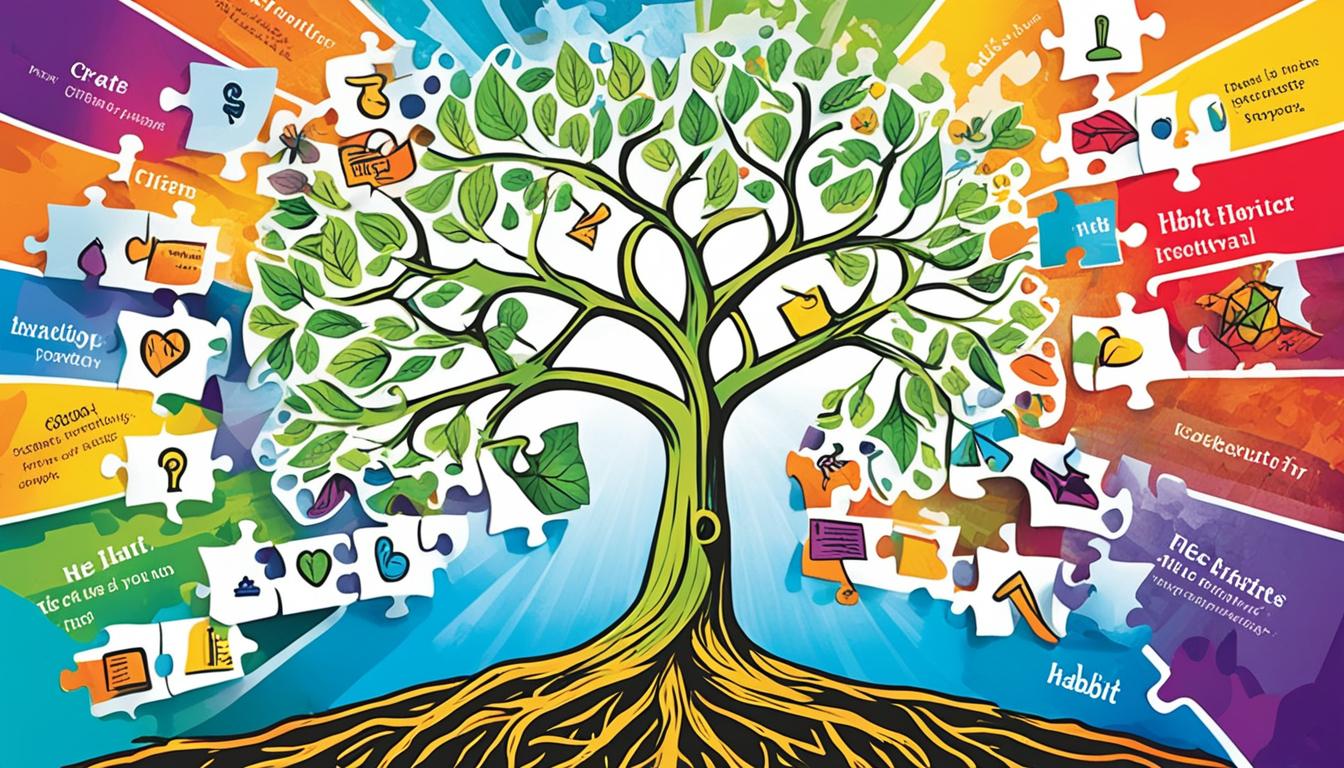7 Habits of Highly Effective Teens Explained
Being a teenager can be a challenging time filled with transitions, responsibilities, and decisions. However, there are successful habits that can empower teens to navigate these challenges and achieve success in various areas of their lives. In this article, we will explore the 7 habits of highly effective teens and how they can make a positive impact on the lives of teenagers.
Key Takeaways:
- Implementing the 7 habits of highly effective teens can empower teenagers to take control of their lives.
- These habits include being proactive, beginning with the end in mind, putting first things first, thinking win-win, seeking to understand before being understood, synergizing, and sharpening the saw.
- By practicing these habits, teens can set goals, prioritize tasks, develop positive relationships, and practice self-care.
- These habits can lead to enhanced academic performance, improved relationships, and a greater sense of self-worth.
- Incorporating these habits can unlock the potential for success in various aspects of teenage life.
Be Proactive

Being proactive means taking responsibility for your own life and actions. Highly effective teens understand that they have control over their choices and take initiative in making decisions that impact them. By being proactive, teens can shape their own future and avoid being controlled by external circumstances.
When teens are proactive, they become the drivers of their own lives. They don’t wait for opportunities to come their way; instead, they actively seek out and create opportunities for themselves. Being proactive allows teens to take control of their education, exam preparation, relationships, and other areas of their life.
By taking responsibility for their actions and choices, proactive teens develop a sense of ownership and accountability. They understand that their decisions have consequences, and they are willing to face the outcomes, whether positive or negative. This habit empowers teens to be in control of their lives, rather than being passive bystanders.
The Power of Being Proactive
“I am the captain of my ship, and I am responsible for charting its course. No one else can control my life except me.”
When teens are proactive, they become proactive learners. Instead of waiting for their teachers to provide all the information, they actively seek knowledge and engage in self-directed learning. They take initiative to go beyond the curriculum, explore their interests, and pursue personal growth. By being proactive in their education, teens can excel academically and develop a thirst for lifelong learning.
Furthermore, being proactive in relationships allows teens to build strong connections with others. Rather than waiting for others to reach out, proactive teens take the first step in initiating conversations, showing support, and resolving conflicts. This habit fosters effective communication, empathy, and understanding, leading to healthier and more fulfilling relationships.
Take Control, Shape Your Future
Teens, it’s time to take control of your life! Embrace the habit of being proactive and become the architect of your own destiny. Don’t let external circumstances dictate your path; instead, chart your own course and shape your future according to your goals and aspirations.
Remember, being proactive is about more than just taking responsibility; it’s about seizing opportunities, setting goals, and making positive choices. By being proactive, you can control your life, shape your own future, and unlock your full potential.
Begin With The End In Mind

Highly effective teens understand the importance of setting goals. They begin with the end in mind, envisioning the result they want to achieve and then working backward to create a plan that will turn their dreams into reality. By breaking down their aspirations into smaller, achievable steps, teens can stay motivated and focused on their desired outcomes. This habit empowers them to develop patience and discipline in working towards their goals.
Setting goals allows teens to have a clear vision of what they want to accomplish and create a roadmap for success. It gives them a sense of direction and purpose, guiding their actions and decisions. By visualizing their desired outcomes, teens can better prioritize their time and efforts, ensuring they align with their ultimate goals.
“The future belongs to those who believe in the beauty of their dreams.”
– Eleanor Roosevelt
By beginning with the end in mind, teens can also overcome obstacles and setbacks along the way. When faced with challenges, they can draw upon their vision of the end result to stay motivated and persevere. This mindset allows them to view setbacks as temporary roadblocks rather than permanent failures.
Moreover, setting goals helps teens develop valuable skills such as planning, organization, and time management. They learn to prioritize tasks, allocate their resources effectively, and make strategic decisions. These skills are crucial not only for achieving their immediate goals but also for future success in academics, career, and personal life.
Begin with the end in mind is a habit that encourages teens to think long-term and adopt a proactive approach to their lives. It empowers them to take control of their destiny and work towards creating the future they envision for themselves. By setting goals and consistently working towards them, teens can achieve success, personal growth, and fulfillment in all areas of their lives.
| Benefits of Beginning with the End in Mind |
|---|
| 1. Clarity in vision and purpose |
| 2. Enhanced motivation and perseverance |
| 3. Improved planning and organization skills |
| 4. Better prioritization and time management |
| 5. Increased focus and direction |
| 6. Proactive mindset and control over one’s life |
| 7. Future-oriented thinking and goal-oriented actions |
Put First Things First

In the journey towards becoming highly effective teens, one of the key habits to develop is the ability to put first things first. This habit revolves around recognizing priorities and dedicating time and effort to tasks that align with those priorities. By mastering this skill, teens can effectively manage their time and focus on what truly matters.
Time management is a crucial aspect of putting first things first. It involves allocating time wisely to different activities based on their importance and urgency. Highly effective teens understand that time is a valuable resource and strive to make the most of it. They prioritize their studies during exam season, ensuring they invest sufficient time and effort to achieve academic success. By organizing their time effectively, they are able to balance their responsibilities and commitments.
“Putting first things first means deciding what is most important to you and taking action on it. It’s about focusing on your priorities and not letting distractions and external influences steer you off course.”
When it comes to putting first things first, it’s important to have a clear understanding of personal goals and values. By aligning tasks and activities with these goals and values, teens can make informed decisions about where to invest their time and energy.
Examples of Prioritization:
- Completing important assignments before engaging in recreational activities
- Attending important school events or extracurricular activities before socializing with friends
- Allocating time for self-care and relaxation to maintain overall well-being
By prioritizing tasks, highly effective teens develop essential time management skills. These skills not only help them achieve their immediate goals but also lay a strong foundation for future success. Learning to prioritize tasks enables teens to manage their time effectively, reduce stress, and avoid becoming overwhelmed by multiple commitments.
The ability to put first things first empowers teens to take control of their lives and make deliberate choices. By recognizing and focusing on their priorities, teens can create a sense of purpose and direction. With practice, this habit becomes second nature, leading to increased productivity, efficiency, and ultimately, success.
| Benefits of Putting First Things First: |
|---|
| Prioritization leads to effective time management |
| Reduces stress and overwhelm |
| Improves decision-making ability |
| Enhances productivity and efficiency |
Think Win-Win

Thinking win-win is an attitude highly effective teens adopt. They understand the importance of collaboration and seek mutual benefits in every situation. Whether it’s studying in a group, maintaining healthy friendships, or working on team projects, thinking win-win enables teens to navigate interactions and relationships with a cooperative mindset. By focusing on win-win outcomes, teens can foster positive connections and create a harmonious environment.
Being a team player is crucial for success in various areas of life. When teens approach situations with a win-win mentality, they prioritize finding solutions that benefit everyone involved. This approach promotes healthy friendships, where individuals support and uplift one another to achieve common goals. By embracing a win-win mindset, teens not only build strong relationships but also cultivate valuable skills such as communication, negotiation, and conflict resolution.
Emphasizing mutual benefits in interactions allows teens to see beyond their personal interests and consider the well-being of others. This mindset encourages empathy and understanding, enabling teens to develop a broader perspective and appreciate diverse viewpoints. By seeking win-win outcomes, teens learn to value cooperation over competition, leading to a more inclusive and supportive social environment.
Benefits of Thinking Win-Win
- Enhanced Collaboration: Thinking win-win fosters a collaborative approach, allowing teens to work together effectively towards shared goals.
- Mutual Growth: By focusing on mutual benefits, teens create an environment where everyone has the opportunity to grow and thrive.
- Conflict Resolution: The win-win mindset promotes constructive conflict resolution, helping teens navigate disagreements and find solutions that satisfy all parties involved.
- Emotional Intelligence: Adopting a win-win attitude enhances emotional intelligence, as teens learn to manage their emotions and understand the impact of their behaviors on others.
- Positive Relationships: Thinking win-win cultivates healthy friendships and positive relationships, based on trust, respect, and shared success.
“Coming together is a beginning. Keeping together is progress. Working together is success.” – Henry Ford
Developing a win-win mindset requires practice and self-awareness. Teens can start by considering the perspectives and needs of others in their interactions. They can actively seek opportunities to find mutually beneficial solutions and approach challenges with a cooperative attitude.
Example of a Win-Win Scenario
| Scenario | Win-Lose Approach | Win-Win Approach |
|---|---|---|
| Group Project | One individual dominates the project, disregarding the input and ideas of others. The group members feel disengaged and demotivated. | The group members collaborate, valuing everyone’s input and assigning tasks based on each person’s strengths. They work towards a shared goal, motivating one another and producing a high-quality project. |
| Friendship Conflict | Friends engage in a competition to be the best, often belittling or undermining each other’s achievements. The friendship becomes strained and filled with negativity. | The friends support and encourage one another, celebrating individual successes and offering support during challenges. They create a supportive friendship based on mutual growth and well-being. |
| Academic Competition | Students focus solely on outperforming their peers, often resorting to dishonest practices. The academic environment becomes toxic and unhealthy. | Students recognize the benefits of collaboration and knowledge-sharing. They study together, exchange ideas, and support each other’s academic progress, fostering a healthy and positive learning environment. |
By embracing the win-win mindset, highly effective teens build strong foundations for success in various aspects of their lives. They develop valuable interpersonal skills, foster healthy friendships, and contribute to creating a positive and supportive social environment.
Seek First To Understand, Then Be Understood

Highly effective teens understand that effective communication is not just about expressing their own thoughts and opinions but also about seeking to understand others. This habit of seeking to understand before being understood is rooted in active listening and a genuine desire to empathize with others. By actively listening, teens can develop deeper connections with their peers, family members, and teachers, fostering open and respectful communication within relationships.
“When you talk, you are only repeating what you already know. But if you listen, you may learn something new.” – Dalai Lama
Active listening involves more than simply hearing the words someone is saying. It requires undivided attention, empathy, and a genuine curiosity to understand the speaker’s perspective. Through active listening, highly effective teens can gain valuable insights into others’ thoughts, feelings, and experiences.
By seeking to understand first, teens can create a safe and supportive space for open dialogue and effective communication. This habit cultivates patience and humility, allowing teens to approach conversations with an open mind. It paves the way for collaboration, problem-solving, and the development of healthy relationships. Seeking to understand before being understood helps teens break down barriers, resolve conflicts, and bridge differences, leading to stronger connections and a deeper understanding of others.
Benefits of Seek First To Understand, Then Be Understood
Active listening:
- Fosters empathy and understanding
- Builds stronger relationships
- Creates an environment of trust and respect
- Enhances problem-solving and conflict resolution skills
- Develops effective communication and interpersonal skills
Incorporating this habit into their daily lives, highly effective teens have the opportunity to not only express their own thoughts and opinions but also to truly connect with others on a deeper level. By seeking to understand before being understood, teens can unlock the power of effective communication and create meaningful relationships that support their personal growth and success.
Synergize

Synergizing is the habit of working together as a team and embracing creative cooperation. Highly effective teens understand that collaboration can lead to better outcomes. By recognizing that “two heads are better than one,” teens can leverage the strengths and ideas of others to achieve more as a collective. This habit is particularly useful in academic settings, social situations, and group projects, where collaboration is necessary for success.
The Power of Teamwork
Teamwork is the key to unlocking the full potential of a group. When individuals come together and synergize, they can combine their unique skills, knowledge, and perspectives to tackle complex challenges. In a team, each member brings something valuable to the table, and by working collaboratively, they can accomplish more than they could individually.
“Alone we can do so little; together we can do so much.” – Helen Keller
When teens synergize, they create a positive and dynamic environment where ideas flow freely, and innovation thrives. By valuing and respecting each other’s contributions, teens can build strong relationships and establish a foundation of trust within the team.
Benefits of Creative Cooperation
- Promotes innovative thinking and problem-solving
- Fosters a sense of camaraderie and belonging
- Improves communication and interpersonal skills
- Encourages empathy and understanding
- Enhances decision-making processes
When teens synergize, they tap into a collective intelligence that breeds creativity and generates fresh ideas. Through creative cooperation, they are able to find innovative solutions to challenges and devise strategies that might not have been possible on their own.
Example: A Successful Teamwork Scenario
| Team members | Roles |
|---|---|
| Emily | Organizer and planner |
| Michael | Creative thinker and problem solver |
| Sarah | Researcher and detail-oriented |
| David | Persuasive communicator |
In a group project, Emily takes on the role of the organizer and ensures the team stays on track by setting deadlines and assigning tasks. Michael, with his creative thinking skills, comes up with innovative ideas and helps solve complex problems. Sarah, the researcher, gathers relevant information and pays attention to every detail. David is the persuasive communicator who presents the team’s work effectively to the audience.
As a team, they synergize by combining their individual strengths and expertise to produce an outstanding result. They communicate openly, share ideas, and support each other throughout the project. Together, they create a cohesive and efficient team that delivers exceptional outcomes.
By synergizing, teens can experience the power of teamwork and creative cooperation. They learn to appreciate the diverse perspectives and contributions of others, while also contributing their own unique skills and ideas. Synergizing not only enhances the quality of outcomes but also fosters a sense of unity and fulfillment within the team. Encourage teens to embrace the habit of synergizing and witness the transformative impact it brings to their lives.
Sharpen The Saw

Highly effective teens prioritize self-care and understand the importance of taking breaks to renew themselves. Sharpening the saw means dedicating time to nurture physical, mental, emotional, and spiritual well-being. This habit encourages teens to take care of their bodies through exercise, rest, and healthy eating. It also emphasizes the need for mental stimulation, emotional balance, and spiritual nourishment. By practicing self-care, teens can maintain overall wellness and sustain their effectiveness in other areas of life.
Physical well-being is the foundation of overall health. Engaging in regular exercise enhances stamina, strength, and flexibility. Taking breaks, getting enough sleep, and fueling the body with nutritious food are essential for maintaining energy levels and supporting optimal performance.
Mental well-being is equally crucial. Activities that stimulate the mind, such as reading, solving puzzles, or learning new skills, contribute to mental agility and cognitive development. Mental self-care involves practicing mindfulness, managing stress, and cultivating positive thoughts to maintain a healthy mindset.
Emotional well-being revolves around managing emotions and nurturing positive relationships. Effective teens recognize the importance of expressing emotions in healthy ways, building resilience, and seeking support from trusted friends and family. They also prioritize activities that bring them joy and fulfillment.
Spiritual well-being encompasses a sense of purpose, values, and connection to something greater than oneself. Highly effective teens take time to reflect, engage in activities that align with their values, and cultivate gratitude. Nurturing their spiritual well-being allows them to find meaning and maintain a sense of balance.
By adopting a holistic approach to self-care and consistently sharpening the saw, teens can ensure they are operating at their best. This habit sets the foundation for personal growth, resilience, and overall well-being. Remember, taking care of yourself is not selfish; it is an essential aspect of being an effective and successful teen.
Paradigms and Principles
Paradigms and principles are essential components of the habits of highly effective teens. Paradigms refer to the perceptions or points of view that shape one’s reality. For highly effective teens, cultivating positive paradigms is crucial for personal growth and success. They consciously avoid limiting beliefs and negative self-perceptions that hinder their progress. By adopting optimistic and growth-oriented paradigms, teens can open themselves up to endless possibilities and embrace opportunities for self-improvement.
Principles, on the other hand, serve as guiding values that help teens make wise decisions and navigate challenging situations. These principles are the moral compass that directs their actions and behaviors. For example, the principle of integrity guides teens to act with honesty and sincerity in all aspects of their lives. By aligning their paradigms with positive principles, highly effective teens develop a mindset that fuels personal growth and empowers them to overcome obstacles.
The Power of Positive Paradigms
“Your beliefs become your thoughts,
your thoughts become your words,
your words become your actions,
your actions become your habits,
your habits become your values,
your values become your destiny.”
– Mahatma Gandhi
Positive paradigms create a fertile ground for personal growth. When teens adopt positive perspectives and beliefs, they can transform their mindsets from pessimistic to optimistic. This shift allows them to see challenges as opportunities, setbacks as learning experiences, and failures as stepping stones toward success. Positive paradigms empower teens to face adversity with resilience and determination.
Guiding Principles for Success
“I believe that every single event in life happens in an opportunity to choose love over fear.”
– Oprah Winfrey
Principles act as guiding beacons in the lives of highly effective teens. These principles help teens navigate complex situations, make ethical choices, and maintain their integrity. Some common guiding principles include:
- Integrity: Acting with honesty and maintaining strong moral principles.
- Respect: Treating oneself and others with kindness, dignity, and empathy.
- Responsibility: Taking ownership of one’s actions and being accountable for the consequences.
- Growth Mindset: Embracing challenges, seeking opportunities to learn, and believing in the potential for personal growth.
By anchoring their decisions and actions in these guiding principles, teens can make choices that align with their values and goals. Principles provide a solid foundation for ethical behavior and promote personal growth and development.
Paradigms and Principles: A Winning Combination
When paradigms and principles align, highly effective teens create a positive mindset that supports personal growth and success. By consciously choosing optimistic paradigms and living by guiding principles, teens can overcome challenges, develop resilience, and unlock their full potential. The synergy between positive paradigms and guiding principles serves as a powerful force for personal transformation and empowers teens to navigate the complexities of life with confidence.
| Advantages of Positive Paradigms | Guiding Principles for Success |
|---|---|
| 1. Embracing optimism and growth mindset | 1. Integrity as a compass for ethical choices |
| 2. Seeing challenges as opportunities | 2. Respect for oneself and others |
| 3. Building resilience and determination | 3. Taking responsibility for actions |
| 4. Transforming failures into stepping stones | 4. Embracing a mindset of continuous growth |
The combination of positive paradigms and guiding principles empowers teens to thrive and grow, propelling them towards personal success.
The Personal Bank Account
The personal bank account plays a crucial role in the well-being and success of highly effective teens. It refers to how one feels about themselves and encompasses their self-esteem and self-worth. Understanding and nurturing their personal bank account can contribute to a positive self-perception and overall growth.
Highly effective teens make regular deposits into their personal bank account, which involves practices that uplift and enrich their sense of self. These deposits can include:
- Keeping promises to themselves
- Being honest and authentic
- Displaying kindness towards themselves and others
- Practicing self-renewal through activities that nurture their physical, mental, and emotional well-being
By actively making these deposits, teens can build a strong sense of self that supports their growth and success. It allows them to develop a positive self-esteem, believe in their abilities, and maintain a healthy self-worth. Just like a bank account, the more deposits made, the stronger the balance becomes.
Conversely, there are also withdrawals from the personal bank account that can negatively impact teens’ self-perception. These withdrawals occur when individuals break personal promises, engage in self-destructive behaviors, or neglect their talents and passions. Recognizing and minimizing these withdrawals is essential for maintaining a positive self-image.
Investing in the personal bank account goes beyond just surface-level actions. It requires a deep understanding of oneself and conscious efforts to prioritize self-care, growth, and self-compassion. By making consistent deposits and managing withdrawals effectively, highly effective teens can cultivate a healthy and robust personal bank account that supports their overall well-being and success.
Famous Quote
“Your relationship with yourself sets the tone for every other relationship you have.” – Robert Holden
| Deposits into the Personal Bank Account | Withdrawals from the Personal Bank Account |
|---|---|
| Keeping promises to themselves | Breaking personal promises |
| Being honest and authentic | Engaging in self-destructive behaviors |
| Displaying kindness towards themselves and others | Neglecting talents and passions |
| Practicing self-renewal |
Habit 1 – Be Proactive
Being proactive is a crucial habit for highly effective teens. It means taking responsibility for your own life and actions, rather than letting circumstances control you. By being proactive, you empower yourself to be in control of various aspects of your life, such as your education, exam preparation, relationships, and more.
Highly effective teens understand that they have the power to make choices and take initiative to shape their future. They don’t wait for things to happen; they make things happen. When faced with challenges, proactive teens don’t blame external factors. Instead, they seek solutions and take action to overcome obstacles.
“Proactive people focus their efforts on the things they can control.”
– Stephen Covey
By being proactive, you can develop a sense of ownership and agency in your life. You become the driver of your own success, creating opportunities instead of waiting for them to come your way. Proactive teens understand that they are not victims of circumstances but creators of their own destiny.
Take control of your life today by being proactive. Reflect on your goals and aspirations, and start taking small steps towards achieving them. Don’t shy away from challenges; instead, embrace them as opportunities for growth and learning. Remember, you have the power to control your life and make a difference.
Benefits of Being Proactive:
- Greater sense of control and empowerment
- Increased productivity and efficiency
- Improved problem-solving skills
- Enhanced self-confidence and self-esteem
- Stronger relationships with others
| Characteristics of Proactive Teens | Characteristics of Reactive Teens |
|---|---|
| Take responsibility for their actions | Blame others for their problems |
| Set goals and take action to achieve them | Wait for things to happen |
| Seek solutions to challenges | Get overwhelmed by challenges |
| Show initiative in all areas of life | Wait for instructions or guidance |
Conclusion
The 7 habits of highly effective teens provide a valuable framework for success and personal growth during adolescence. By incorporating these habits into their daily lives, teenagers can take control of their futures, set goals, prioritize tasks, foster positive relationships, practice self-care, and cultivate a positive mindset.
Implementing these habits empowers teens to navigate the challenges they face and unlock their full potential in various aspects of life. By embracing these effective habits, teenagers can experience enhanced academic performance, improved relationships, and a greater sense of self-worth.
Take the first step towards teen success today by practicing these habits. Start by being proactive, setting goals, prioritizing tasks, thinking win-win, seeking understanding, synergizing with others, and taking care of your physical and mental well-being.
By consistently applying these habits, teenagers can develop the skills and mindset needed to thrive in their teenage years and beyond. Remember, the 7 habits of highly effective teens are not a one-time solution, but a lifelong practice that can lead to lasting success and fulfillment.
FAQ
What are the 7 habits of highly effective teens?
The 7 habits of highly effective teens are: be proactive, begin with the end in mind, put first things first, think win-win, seek first to understand, then be understood, synergize, and sharpen the saw.
What does it mean to be proactive?
Being proactive means taking responsibility for your own life and actions. It involves understanding that you have control over your choices and taking initiative in making decisions that impact you.
How can the habit of putting first things first help me?
By putting first things first, you prioritize tasks and manage your time effectively. This habit allows you to focus on what truly matters and create a balanced approach to your daily tasks.
What does it mean to think win-win?
Thinking win-win means seeking mutual benefits in every situation. It involves collaborating and maintaining a cooperative mindset in interactions and relationships.
How can I practice active listening?
To practice active listening, you need to have a genuine desire to understand others’ perspectives and experiences. By doing so, you develop patience and humility, enabling effective communication and fostering respectful relationships.
What does it mean to synergize?
Synergizing means working together as a team and embracing creative cooperation. It involves leveraging the strengths and ideas of others to achieve better outcomes collectively.
Why is self-care important for teens?
Self-care is crucial for teens as it helps maintain physical, mental, emotional, and spiritual well-being. By dedicating time to nurture themselves, teens can sustain their effectiveness in other areas of life.
How can I develop a positive mindset and personal growth?
By aligning your paradigms with positive principles, you can cultivate a mindset that supports personal growth. This involves having a positive perception of yourself, avoiding limiting beliefs, and adopting values that guide your decisions.
What is the personal bank account?
The personal bank account refers to how you feel about yourself. By making deposits into your personal bank account, such as keeping promises, being honest, and practicing self-renewal, you can build a strong sense of self-worth and support your growth and success.
How can I implement the 7 habits of highly effective teens in my life?
Start by being proactive, setting goals, putting first things first, thinking win-win, practicing active listening, synergizing, and prioritizing self-care. By incorporating these habits, you can take control of your life, develop positive relationships, and unlock your potential for success.
How can the 7 habits of highly effective teens benefit me?
Integrating the 7 habits into your life can lead to enhanced academic performance, improved relationships, and a greater sense of self-worth. By practicing these habits, you can navigate challenges, set goals, and cultivate habits that support your overall success.







